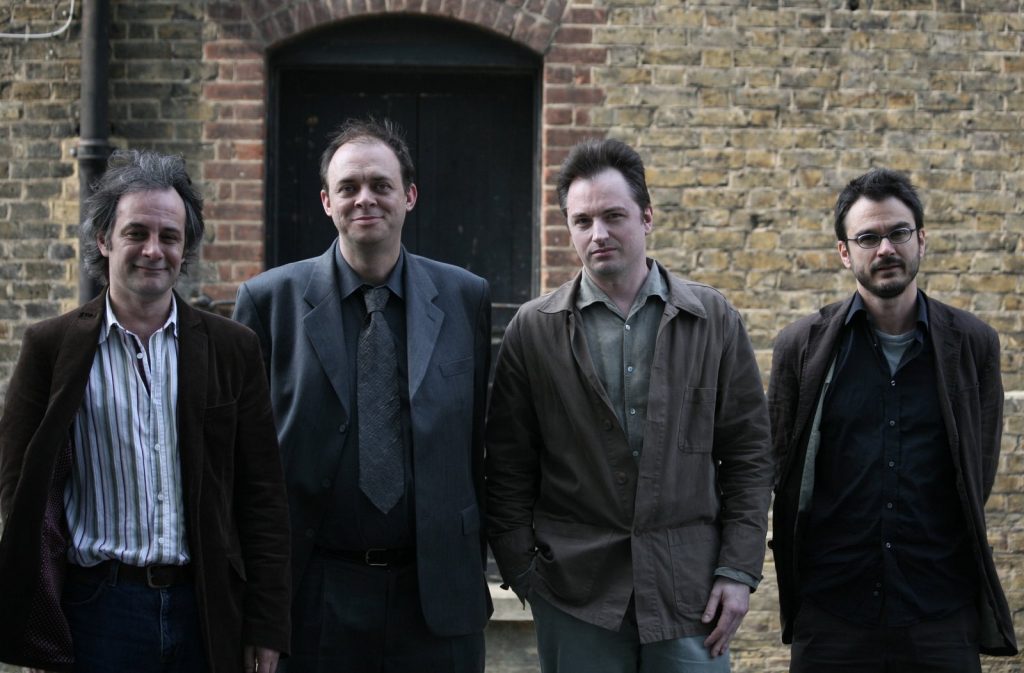
Graham Harman (2nd from right) and fellow speculative materialists in 2007
In 1942, the Argentine writer Jorge Luis Borges cooked up an entirely fictitious “Chinese” encyclopedia entry for animals. Among its nonsensical subheadings were “Embalmed ones”, “Stray dogs”, “Those that are included in this classification” and “Those that, at a distance, resemble flies”.
Explaining why these categories make no practical sense is a useful and enjoyable intellectual exercise – so much so that in in 1966 the French philosopher Michel Foucault wrote an entire book inspired by Borges’ notion. Les mots et les choses (The Order of Things) became one of the defining works of the French philosophical movement called structuralism.
How do we categorise the things we find in the world? In Immaterialism, his short and very sweet introduction to his own brand of philosophy, “object-oriented ontology”, the Cairo-based philosopher Graham Harman identifies two broad strategies. Sometimes we split things into their ingredients. (Since the enlightenment, this has been the favoured and extremely successful strategy of most sciences.) Sometimes, however, it’s better to work in the opposite direction, defining things by their relations with other things. (This is the favoured method of historians and critics and other thinkers in the humanities.)
Why should scientists care about this second way of thinking? Often they don’t have to. Scientists are specialists. Reductionism – finding out what things are made of – is enough for them.
Naturally, there is no hard and fast rule to be made here, and some disciplines – the life sciences especially – can’t always be reducing things to their components.
So there have been attempts to bring this other, “emergentist” way of thinking into the sciences. One of the most ingenious was the “new materialism” of the German entrepreneur (and Karl Marx’s sidekick) Friedrich Engels. One of Engels’s favourite targets was the Linnaean system of biological classification. Rooted in formal logic, this taxonomy divides all living things into species and orders. It offers us a huge snapshot of the living world. It is tremendously useful. It is true. But it has limits. It cannot record how one species may, over time, give rise to some other, quite different species. (Engels had great fun with the duckbilled platypus, asking where that fitted into any rigid scheme of things.) Similarly, there is no “essence” hiding behind a cloud of steam, a puddle of water, or a block of ice. There are only structures, succeeding each other in response to changes in the local conditions. The world is not a ready-made thing: it is a complex interplay of processes, all of which are ebbing and flowing, coming into being and passing away.
So far so good. Applied to science, however, Engels’ schema turn out to be hardly more than a superior species of hand-waving. Indeed, “dialectical materialism” (as it later became known) proved so unwieldy, it took very few years of application before it became a blunt weapon in the hands of Stalinist philosophers who used it to demotivate, discredit and disbar any scientific colleague whose politics they didn’t like.
Harman has learned the lessons of history well. Though he’s curious to know where his philosophy abuts scientific practice (and especially the study of evolution), he is prepared to accept that specialists know what they are doing: that rigor in a narrow field is a legitimate way of squeezing knowledge out of the world, and that a 126-page A-format paperback is probably not the place to reinvent the wheel.
What really agitates him, fills his pages, and drives him to some cracking one-liners (this is, heavens be praised, a *funny* book about philosophy) is the sheer lack of rigour to be found in his own sphere.
While pillorying scientists for treating objects as superficial compared with their tinest pieces, philosophers in the humanities have for more than a century been leaping off the opposite cliff, treating objects “as needlessly deep or spooky hypotheses”. By claiming that an object is nothing but its relations or actions they unknowingly repeat the argument of the ancient Megarians , “who claimed that no one is a house-builder unless they are currently building a house”. Harman is sick and tired of this intellectual fashion, by which “‘becoming’ is blessed as the trump card of innovators, while ‘being’ is cursed as a sad-sack regession to the archaic philosophies of olden times”.
Above all, Harman has had it with peers and colleagues who zoom out and away from every detailed question, until the very world they’re meant to be studying resembles “the indeterminate momentum of the throbbing whole” (and this is not a joke — this is the sincerely meant position statement of another philosopher, a friendly acquaintance of his, Jane Bennett).
So what’s Harman’s solution? Basically, he wants to be able to talk unapologetically about objects. He explores a single example: the history of the Dutch East India Company. Without toppling into the “great men” view of history – according to which a world of inanimate props is pushed about by a few arbitrarily privileged human agents – he is out to show that the EIC was an actual *thing*, a more-or-less stable phenomenon ripe for investigation, and not simply a rag-bag collection of “human practices”.
Does his philosophy describe the Dutch East India Company rigorously enough for his work to qualify as real knowledge? I think so. In fact I think he succeeds to a degree which will surprise, reassure and entertain the scientifically minded.
Be in no doubt: Harman is no turncoat. He does not want the humanities to be “more scientific”. He wants them to be less scientific, but no less rigorous, able to handle, with rigour and versatility, the vast and teeming world of things science cannot handle: “Hillary Clinton, the city of Odessa, Tolkein’s imaginary Rivendell… a severed limb, a mixed herd of zebras and wildebeest, the non-existent 2016 Chicago Summer Olympics, and the constellation of Scorpio”.
Immaterialism
Graham Harman
Polity, £9.99
